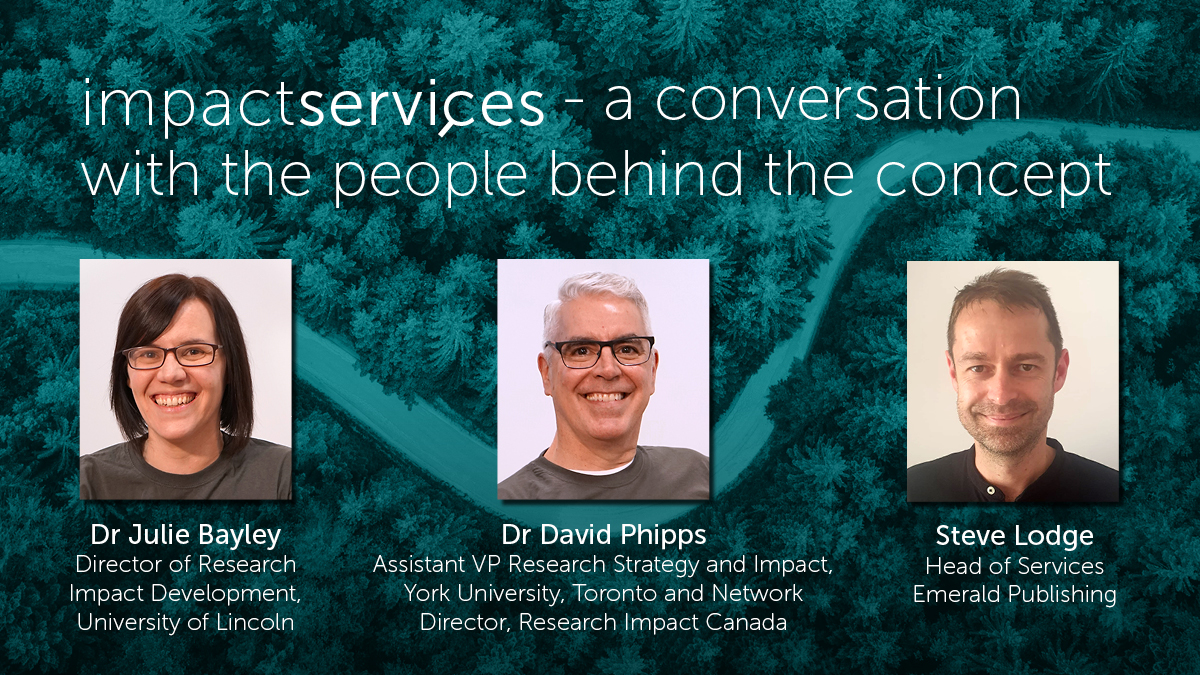
A conversation with the people behind the concept
In the following interview, Steve Lodge, Head of Services at Emerald Publishing, together with Dr Julie Bayley, Director of Research Impact Development, University of Lincoln and Dr David Phipps, Assistant VP Research Strategy and Impact, York University, Toronto and Network Director, Research Impact Canada, introduce Emerald’s new Impact services and explore our journey to getting here.
What is Impact services & how did it get started?
Steve: Impact services is a new service we have launched in collaboration with Dr Julie Bayley and Dr David Phipps, and with valuable input from our friends in the research community, to tackle the challenges felt in supporting a culture of impact. Our goal throughout has been to support the driving of impact literacy, for academics, research managers and institutions, to help connect research to society and drive real world change.
Creating and supporting a culture of impact is an important foundation to ensure that planning for impact happens at the outset of every research project. However, we understand that the path to embedding impact into a daily reality for academics isn’t always easy.
With this in mind, we have spent the past few years working closely with research staff who face this challenge every day. This has allowed us to better understand the barriers to impact and impact culture, and how we as a publisher can play our part in breaking these down.
What kind of challenges does the research community face in driving a culture of impact?
Julie: Whilst applied research isn’t new, more formal impact agendas are far more recent and often connected with income (via funding and assessment). Within an already pressured higher education system, people often do not have the time or space to really get to grips with impact, making it difficult to judge how research might be best facilitated, implemented and measured. Individual experiences and institutional strategies vary enormously and people can feel left adrift in knowing how to ‘do impact’ within their already busy jobs.
David: The challenges differ depending on the researcher’s context. Impact may be driven either by the personal mission of the researcher or external assessment processes and sometimes both, so it can be challenging for a researcher to navigate diverse drivers. Fundamentally, a researcher that wants to embed impact in their work will approach impact differently than a researcher who is told they must consider impact. This is what originally brought us to this collaboration by comparing the Canadian research system which does not have impact assessment and the UK system where impact is assessed, and funds are allocated through the Research Excellence Framework. That comparison led us to create the concept of 'research impact literacy'.
We use the word 'culture'. That is important because it underpins researchers’ and institutions’ attitudes to and support for impact. If impact is part of the overall research culture, it is not seen as a one-off exercise to demonstrate impact retrospectively but an ongoing process of engagement with impact throughout the research cycle and throughout a researcher’s career with appropriate support for graduate students, early career researchers and researchers in a mature stage of their career.
What will the service include & who should be using it?
Steve: We have launched the service with three core tools which have been developed in response to the feedback we have received from academics and research managers about the challenges that they face every day. This includes:
- Impact Healthcheck – this has been designed to help institutions, likely via the research office, assess the extent to which impact already forms part of an institutional culture and analyse what is working and what could be improved.
- Impact Planner – we designed this to help academics plan, articulate and execute impact in their project through an impact plan and stakeholder map.
- Impact Skills – this provides a comprehensive set of impact related learning materials which helps researchers and research managers build key capabilities such as effective communication, strategy and planning, and developing partnerships with those stakeholders who can influence change.
How can the service help those in the research community?
Julie: The tools within the service help in three main ways:
- supporting institutions to build healthy strategies and processes
- equipping individuals to build realistic, appropriate and achievable impact plans for their work
- strengthening the range of skills within the sector to join research with society
By having focused tools, based on experience across the sector, we can help drive meaningful, achievable and impact literate approaches.
David: Whether you’re a researcher or you are a research institution, these services can help build your impact literacy. That means that you will know how to create impact. You will appreciate what impact is arising and the people who are working in impact will have the skills for both.
If you’re a researcher at any stage of your career, these services can help build the skills and use the tools needed to embed engagement and impact as an ongoing part of their research.
For institutions, these services can help build the right policies, tools, staff and services that will allow you to support impact in the research programs of your faculty, staff and students and the non-academic partners from the public, private and non-profit sectors.
Is this a one-size fits all solution to driving impact?
Steve: In short, no. Whilst we recognise that impact isn’t new, there are many challenges regarding driving impact that will evolve as time passes and we need to be agile in responding to these new issues and how we can support the research community. That’s why we have launched the service with three tools but will continue to work closely with the community, to evolve the service over time.
We also recognise that Emerald cannot change impact culture alone and that we are part of the wider ecosystem aiming to do this. But we are proud to have worked so closely with the research community to understand and address their needs, and by collaborating with figureheads of the impact community we are playing our part in supporting the sector’s drive for research impact.
Why is Emerald launching this?
Steve: At Emerald, we have made a commitment to driving research impact and whilst we are making progress, there is still work to do. Launching this service is another step on our impact journey, of which you can read about in our roadmap PDF.
About Emerald
Founded by management scholars in 1967, and now part of the Cambridge Information Group, Emerald Publishing provides a range of publishing services to help researchers tell their stories in a meaningful and timely way, providing innovative tools and services to build confidence and capability in impactful research. As a proud signatory of DORA, Emerald is committed to establishing new pathways to impact, making research more accessible, and helping communities make decisions that change their world for the better.
For over 50 years Emerald's core purpose has been to champion fresh thinkers and help them make a difference so that little by little those in academia or in practice can unite to bring positive change in the real world. Emerald Publishing is proud to be Highly Commended for the Alison Morrison Diversity and Inclusivity Award in the Independent Publishers Guild's Independent Publishing Awards 2023.
Contact – Emerald Publishing
Tom Shiels
Communications Manager
Emerald Publishing
[email protected]
X: @EmeraldGlobal
Facebook: Emerald Publishing
LinkedIn: Emerald Publishing
